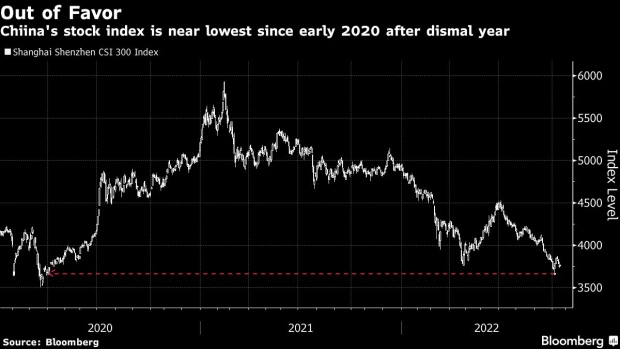Oct 21, 2022
China Market Revival Hopes in Tatters as Congress Disappoints
, Bloomberg News

(Bloomberg) -- A dreadful year for Chinese markets became worse this week as expectations for stimulus measures at the Communist Party Congress were left largely unfulfilled.
The benchmark CSI 300 Index fell 2.6% this week, taking this year’s decline to more than 24%, while the yuan slumped as President Xi Jinping stood by his Covid-Zero policy, and stopped short of announcing any significant measures to bolster an ailing property sector. Meanwhile, officials spooked traders by delaying the release of key economic data with foreign investors selling the most mainland stock this week since March.
At the same time, further outbreaks of coronavirus threatened to worsen a troubled economic outlook. The authorities locked down parts of the central city of Xi’an, confining some of its 13 million people to their homes, while other major areas introduced further restrictions.
Read: Yuan Falls to Lowest Since 2008 on Hawkish Fed, Growth Risks
“The market is looking for catalysts, mainly in adjustments in the Covid-Zero policy and stronger support on the housing market,” said Daniel So, a strategist at CMB International Capital Corp. in Hong Kong. However, “there are no major positive surprises to drive a re-rating in China and Hong Kong stocks, and in particular consumer discretionary, property and Internet sectors,” he said.
There’s still another two days for market-positive measures to emerge from the twice-a-decade party congress, with the announcement of the name lists of the party’s 25-people Politburo and members of the Politburo’s standing committee.
Read More: China’s Big Leadership Reveal Will Show Extent of Xi’s Power
Investors are hopeful that policy makers will switch their attention to introduce measures to prop up the stuttering economy once the leadership reshuffle is finalized. The CSI is set for its first back-to-back annual loss since 2011, while the yuan has declined more than 12% this year and slumped to its weakest since 2008 on Friday.
Quarantine Changes
There was at least one ray of hope Thursday, in the form of a report saying officials are debating whether to reduce the amount of time inbound travelers must spend in mandatory quarantine. Chinese stocks and the yuan rallied following the news, but gains were short-lived.
China’s re-opening is likely to be gradual, and “I don’t think this will get investors excited,” said Kerry Goh, chief investment officer at Kamet Capital Partners Pte. in Singapore. Issues such as tech regulations and property sector deleveraging still remain, he said.
The worsening crisis in the property market, with developers defaulting and home construction stalled, has seen a Bloomberg gauge of high-yield dollar bonds drop to a new low. The average price of the securities fell to a record 54.6 cents on the dollar. Former tech darlings such as Tencent Holdings Ltd. and Alibaba Group Holding Ltd. have seen their stocks plunge at least 40% this year in Hong Kong.
“As investors, we are looking for concrete, analyzable and executable plans from the meeting,” said Zhi Wei Feng, a senior analyst at Loomis Sayles Investments Asia in Singapore. “So far, we only see high-level words, commitment and long-term vision. While China does emphasize development, there are no concrete plans at the moment.”
Weaker Yuan
The yuan extended declines this week. Banks initially followed Beijing’s guidance to trade near the daily fixing, but this only resulted in large swings at the start of each session. Concerns over rising Covid cases and a lack of new policy signals saw the onshore currency fall this week to a 14-year low.
“There’s a sense of disappointment on the lack of significant policy shifts such as Covid Zero to support growth,” said Fiona Lim, senior foreign-exchange strategist at Malayan Banking Bhd. in Singapore. If the dollar and Treasury yields keep rising, the People’s Bank of China may have to relax its grip on the daily fixing, which would see the yuan weaken further, she said.
China’s top securities regulator did move to support the stock market this week with measures such as proposals to encourage companies to buy back shares and to ease curbs on short-term transactions by overseas mutual funds. The Shanghai and Shenzhen stock exchanges also said on Friday they will allow margin trading and short selling of more stocks.
But, traders say those won’t be enough.
Foreign investors net sold 29.3 billion yuan ($4 billion) worth of mainland shares this week via exchange links in Hong Kong, the most since March, according to Bloomberg-compiled data.
Investors will be watching to see if the PBOC will further reduce the amount of cash that banks must keep in reserve or lower interest rates, said William Fong, head of Hong Kong and China equities at Baring Asset Management Asia Ltd. in Hong Kong. The Central Economic Work Conference in December that sets economic priorities for next year will also be scrutinized for signs of more policy support, he said.
Some Winners
If there are any stock winners to be found from this week’s congress, these may be firms in the areas of new technology, manufacturing upgrading, and green development. These stand to benefit from Xi’s push to build “a great modern socialist country in all respects.”
“We continue to strengthen our position in one of the three key themes: technology and green innovation; industry consolidation; and consumption upgrading,” said Minyue Liu, investment specialist for Asian and Greater China Equities at BNP Paribas Asset Management in Hong Kong. “Enterprise software is an interesting space as China has been under invested in this area.”
--With assistance from Wenjin Lv, Lorretta Chen and Tania Chen.
(Updates with yuan hitting 14-year low in sixth paragraph, foreign sale of stocks in 15th paragraph)
©2022 Bloomberg L.P.





